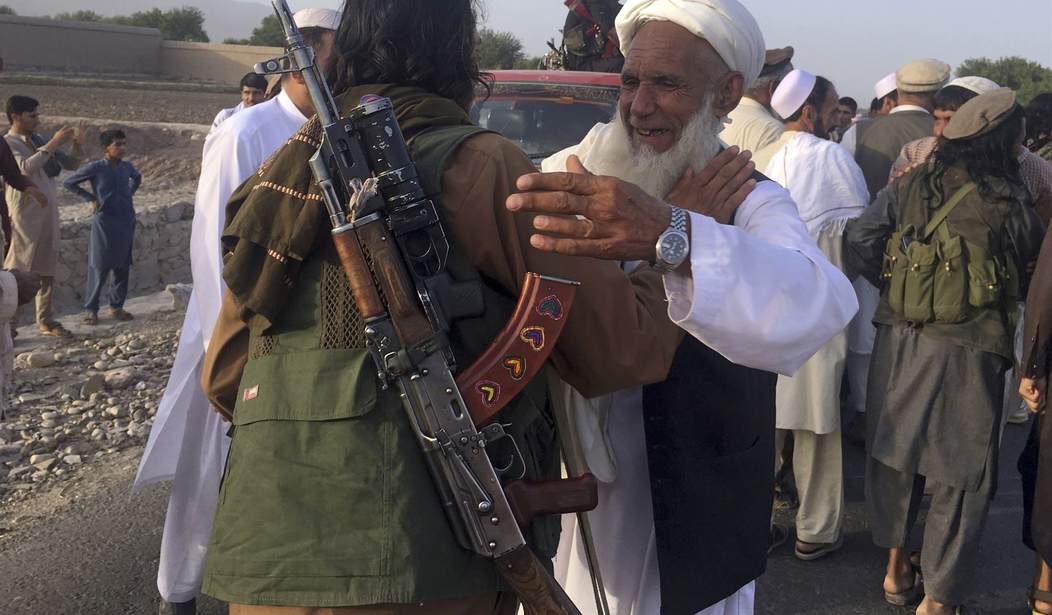Thus far, this seems to be more rumor than confirmed … and in more ways than one. The Taliban has conducted a psy-ops campaign to demoralize the Afghanistan military that includes suggestions that the central government has already cut a deal to cede large swaths of the country to the insurgents. Now, Al Jazeera and other outlets report that a “top government source” claims that Kabul has offered a power-sharing arrangement to end the civil war:
The Afghanistan government has made a power-sharing proposal to the Taliban in exchange for a halt in the escalating violence in the country, a top government source has told Al Jazeera.
The development, which was also reported in Afghanistan’s local media on Thursday, came as the armed group seized Ghazni, the 10th provincial capital to be captured in a week.
The source told Al Jazeera that the offer was presented to the Taliban indirectly through Qatar, which hosts the Taliban’s political office and the continuing Afghan peace talks.
However, the presidential palace in Kabul did not confirm the development, saying there has been no change in its plan while the peace talks are being held in Qatar’s capital, Doha.
Just how seriously should we take this? The Washington Post reported a little earlier that rumors of such a deal have allowed the Taliban to convince their opponents to surrender rather than fight. It’s how the Taliban has managed to consolidate their hold on the northern provinces so quickly:
Hundreds of Afghan forces surrendered to the Taliban in northern Afghanistan on Wednesday, the military’s most significant single collapse since the withdrawal of U.S. forces triggered a wave of territorial gains for the militants.
After holding out for days at a military base on the edge of Kunduz, an entire Afghan army corps surrendered to Taliban fighters Wednesday morning, handing over valuable equipment — much of it American — according to two Afghan officers who spoke on the condition of anonymity because they were not authorized to speak to the media. …
One of the Afghan officers blamed sophisticated Taliban psychological operations for much of the collapse of Afghanistan’s military. He said rumors have spread through the Afghan security forces that Kabul has made a deal with the Taliban to hand over control of portions of the country.
The impact on morale has been detrimental, he said. In recent months, desertions have been so common that the number of Afghan military casualties has dropped in half, he said.
“We aren’t loosing our forces in the fight anymore,” the officer said. “They are just changing their clothes and putting their guns down.”
Another quote puts it more succinctly:
“The Taliban are at the gate, but no one is fighting. I don’t understand,” said one of the Afghan officers, recounting the conversation he had with a member of his unit who was at the Kunduz base when the Taliban began to push closer. “Brother, if no one else fights, why should I fight?” was the reply.
Is this offer from Kabul part of the Taliban’s psy-ops campaign, too? Or was this not so much of a rumor at all? It could be that the Taliban concocted the idea but now it looks a lot more palatable in Kabul. After watching its military collapse over the last week in the north and west, one can understand why Kabul would suggest either power-sharing or a partition plan.
Speaking of rumors, a few spread on Twitter yesterday that Joe Biden might be considering a proposal to partition Afghanistan in an attempt to hold the Taliban at bay. Michael O’Hanlon wrote on Tuesday that partition might be the best-case scenario for Kabul and the US:
Alas, President Joe Biden’s regrettable decision to remove the remaining three thousand or so U.S. combat forces from Afghanistan, and to pull them out fast this year, has put the country’s future in doubt. To be sure, things were bad before. But they are much worse now. Whether or not a Taliban-run Afghanistan would ever become a sanctuary again for Al Qaeda or related terrorists, we would have to work very hard to ensure that was not the case—meaning Biden may wind up having to spend more time and resources on Afghanistan after our departure than was the case before. Millions of Afghans, including women and minorities and intellectuals and reformers and U.S. friends, now face greater peril than ever.
But all is not yet lost. At least, it might not be. Neither U.S. Central Command nor CIA experts truly know. After all, the CIA thought Syrian president Bashar al-Assad would not last more than a few months once the Arab Spring got going; a decade later, he is still president. This is not to criticize the CIA so much as to note the inherent uncertainties in political-military risk assessment.
There is another possible future for Afghanistan, and while not pretty, it is strategically far preferable for the United States: a military stalemate, in which the Taliban holds some of the country and the government while friendly militias hold another big chunk. Perhaps, with luck, this kind of standoff could over time produce the possibility of negotiations on power-sharing. At a minimum, it could help keep U.S. allies alive and provide relatively secure parts of the country from which friendly intelligence assets can be based, making it easier to prevent the emergence of violent extremist sanctuaries in Afghanistan in the future.
To see how this kind of effective partition of the country could emerge, it is useful to paint a rough image of Afghanistan. Most of the country’s forty million inhabitants live in rural areas. But the cities are key, with Kabul roughly at the geographic center, and then four big regional cities along the country’s perimeter, connected by the “ring road:” Mazar-e-Sharif in the north, Jalalabad in the east, Kandahar in the south, Herat in the west. None of these major cities have fallen to the Taliban, though Kandahar (the inspirational home of the Taliban movement, and former home of Osama bin Laden) is now being contested. Kabul and these major regional centers together hold about ten million people; several million more people live in smaller cities like Kunduz, which has in fact fallen, as have certain stretches of territory that the ring road traverses.
Be sure to read it all, but that last paragraph is already out of date. The Taliban are marching on Mazar-e-Sharif, and Kabul has sent an Uzbek militia commander to attempt to break a siege and rescue the city. It won’t take long for Kandahar to fall, especially given the heavy Pashtun dominance in that area of the country. By the time anyone draws up a map for a hypothetical partition, the Taliban’s momentum will likely make it moot.
Besides, who really thinks that the Taliban have any interest in sharing power? Even as a temporary transition, that seems unlikely in the extreme, especially as Afghan forces collapse in front of them. A bloody nose in Mazar-e-Sharif might give them pause, but it’s also easy enough to isolate the northern city while sweeping across the south to Kabul. Also, the Taliban’s theocratic ideology leaves very little room for collaboration and compromise. They want to re-impose the same Islamist tyranny that they enjoyed between the Soviet withdrawal and 9/11.
Partitions and power-sharing are for those who seek cooperation. The Taliban will settle for nothing less than subjugation. Perhaps the Afghan military can be convinced to stand and fight against that, but thus far the results of our 20-year project to create them as a counterweight to the Taliban look like a massive failure.








Join the conversation as a VIP Member